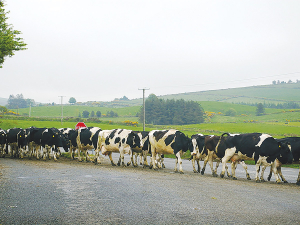DairyNZ Calls for Changes to Government’s Proposed Resource Management Act Reform
DairyNZ says the Government’s proposed Resource Management Act reform needs further work to ensure it delivers on its intent.
 Farmers must ensure body condition score (BCS) targets will be met as per contract on takeover date.
Farmers must ensure body condition score (BCS) targets will be met as per contract on takeover date.
DairyNZ says all cattle, regardless of their purpose, must be treated with care and respect as they are being prepared for transport and then physically transported.
A comfortable and safe journey for cattle reduces effluent on public roads and ensures animals arrive at their destination fit and healthy.
DairyNZ recommends a checklist for transporting cows - for farmers and transporters. This checklist covers: transport planning, days of transport, checking to see if the animals good to go and how to take care of sick animals.
It says farmers must ensure body condition score (BCS) targets will be met as per contract on takeover date.
"If BCS, pasture cover targets or supplements on hand are not going to be met, have a proactive conversation with the other party as to what arrangement can be made to compensate," it says.
Planning for the movement of cattle must commence in the weeks and months prior to transport.
DairyNZ recommends completing Body Condition Scoring (BCS) of all animals for transport and making plans to ensure all stock will reach target BCS by moving day.
"Do a final check over for any cull cows that have been missed - arrange for removal from farm. Where possible, ensure they will go to the nearest processing plant. If processing plants are full then make a Plan B.
"Dry off as many animals as possible and do this with sufficient time to ensure that they are properly dried off on the day of transport and confirm the exact number of cattle you need to transport.
"Ensure all animals that are going to be transported are NAIT compliant (i.e. have NAIT tags in their ear and are registered with NAIT)."
Day Prior To Transporting
Day of Transporting
Budou are being picked now in Bridge Pā, the most intense and exciting time of the year for the Greencollar team – and the harvest of the finest eating grapes is weeks earlier than expected.
The Real Estate Institute of New Zealand (REINZ) has released its latest rural property report, providing a detailed view of New Zealand’s rural real estate market for the 12 months ending December 2025.
Rural retailer Farmlands has released it's latest round of half-year results, labeling it as evidence that its five-year strategy is delivering on financial performance and better value for members.
OPINION: "We are back to where we were a year ago," according to a leading banking analyst in the UK, referring to US president Donald Trump's latest imposition of a global 10% tariff on all exports into the US.
DairyNZ says the Government’s proposed Resource Management Act reform needs further work to ensure it delivers on its intent.
Overseas Trade Minister Todd McClay says he's working constructively with the Labour Party in the hope they will endorse the free trade agreement (FTA) with India when the agreement comes before Parliament for ratification.
OPINION: Expect the Indian free trade deal to feature strongly in the election campaign.
OPINION: One of the world's largest ice cream makers, Nestlé, is going cold on the viability of making the dessert.